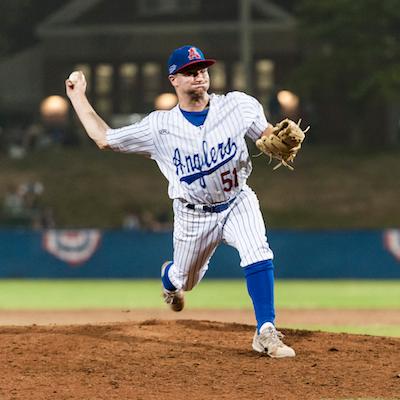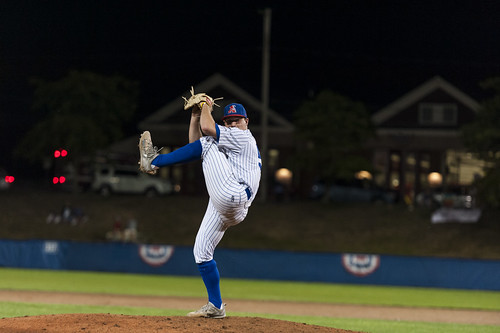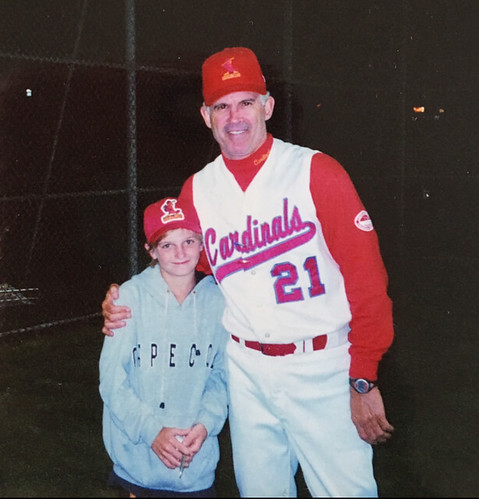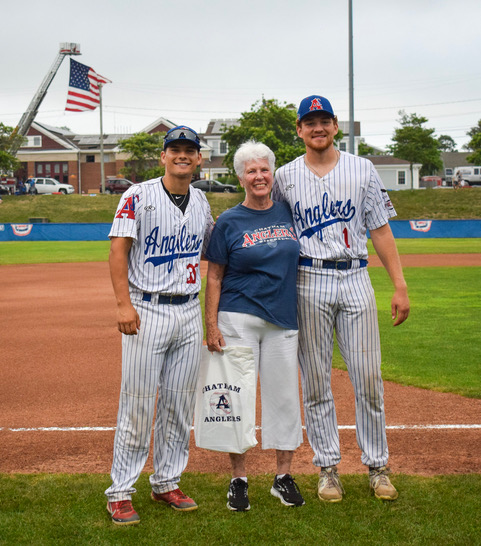Anglers News« Back to 2018 News Archives |
After years of frustration and change, Brock Riley fulfills his childhood dream of playing on the Cape

For all his life, Brock Riley aspired to play in the Cape Cod Baseball League, but as a Division III baseball player at Salem State University, he knew his chances were minuscule.
“I knew it wasn't likely because I was a DIII guy,” Riley said. “Quite honestly, sometimes that label does get in the way. Not a lot of DIII guys get to play [in the Cape] if any at all.”
While most players contact collegiate summer baseball teams with assistance from their college coaches, Riley did so on his own. The right-handed pitcher sent out an email to all 10 Cape League teams prior to the spring season. He got one response — from the Orleans Firebirds.
Orleans manager Kelly Nicholson expressed interest in Riley, kept in touch with him throughout the college season and even texted him after each start he made at Salem State. But come summertime, Nicholson’s plans changed and Riley’s dream came crashing down.
“[Nicholson] seemed serious about bringing me on board and then all of a sudden, before I knew it, it fell through,” Riley said. “That was only a month ago. It was in June when that happened. I understood it, so I decided I was going to send another round of emails. Give it one last push.”
On July 13, Riley shot another round of emails to each Cape League team. In them, he included details about his pitching style, his college statistics, a link to his Baseball America bio and his overwhelming desire to join a CCBL roster.
Riley’s email to the Anglers was sent to general manager Mike Geylin and president Steve West. He didn’t receive a response from either of them. Rather, while driving to his Futures League game for the North Shore Navigators later that day, he got a phone call from Chatham manager Tom Holliday.
“I got a call from a North Carolina number, and I'm just thinking it’s a scam call or something. I don't know anyone from North Carolina,” Riley said. “When he said ‘This is Tom Holliday,’ my stomach sank. He said, “If you can get down here [for a tryout] by tomorrow, I'm gonna give you a shot at making the team.’”
Riley threw 19 pitches, struck out a batter and allowed three hits against the Bristol Blues in a 6-2 loss. Immediately following the game, Riley, still in uniform, got in his car and drove straight to the Cape, arriving at 4 a.m. Six hours later, he threw a bullpen session in front of the Chatham coaching staff. He was offered a spot on the team minutes after finishing.
Riley’s improbable ride to pitching with the Anglers extends beyond his status as a Division III player. The Lowell, Massachusetts native has dealt with rejection and change throughout his career, including playing at three different colleges across all three divisions. Now, he hopes to use his Cape League experience to boost him to his ultimate goal — reaching the MLB.
Riley’s roots
Growing up in Lowell, Massachusetts, Riley was fascinated with baseball from the very beginning.
He grew up a diehard Boston Red Sox fan — Lowell sits 30 miles north of Boston — but most of his exposure to the game came from the Cape Cod Baseball League. Riley’s family spent most of its summers living in Eastham, Massachusetts, a sub-10 minute drive away from Eldredge Park, the home field of the Firebirds.
“We lived right next to a bike path in the summers, and I would take my bike, even if it was by myself, and ride over to the games at Eldredge Park,” Riley said. “I'd just set my chair up on the hill. I easily watched over 100 games.”
Riley attended Orleans games from “before he can remember” until he was 14 or 15 years old. While he grew as a player in the fall and spring, it was during summers when he fell in love with the game and dreamed of a future of playing in the Cape League.
As Riley progressed through little league back in Lowell, he quickly realized his unique ability, but not with his arm. Rather, it was with his bat and glove.
“I remember being a really good shortstop and I could hit really well,” Riley said. “I hit a lot of home runs in little league and I always thought I had a future as a shortstop.”
But Riley’s dream of being a professional shortstop disappeared before he reached high school. Once he was old enough to play on the bigger diamond, he found that his once home run-hitting power now resulted in flyouts. Riley was interested in pitching and had a strong enough arm, so he swapped positions.
When his coaches saw his natural pitching motion, however, they demanded he reconstruct it. Rather than an over-the-top throwing motion, Riley used a submarine-style delivery, releasing the ball with his right arm parallel to the ground.
“I remember getting yelled at by coaches telling me to stop throwing sidearm because it’s not natural,” Riley said. “I actually throw this way naturally, when I throw over-the-top it feels weird.”
Coaches allowed Riley to keep using his sidearm delivery, and throughout his high school career, he used it to his advantage.
He toyed with opposing hitters by spiking his left knee upwards, sometimes reaching the bottom of his chin, before unleashing a sidearm strike. The proximity of the ground to his hand at the point of release varies from pitch to pitch in order to confuse hitters.
Riley says his unorthodox motion paired with differing release points is the foundation of his success on the mound.
“I mix it in completely randomly because I want to be unpredictable. I don't want anyone to pick up any patterns of when I do this or when I do that, I just try to mix it up as randomly as I can,” Riley said. “Sometimes I don't even know what I'm doing and mix it in without myself even knowing about it. I just surprise myself, sometimes mid-windup.”
Bouncing back and forth
As his high school days wound down, Riley knew he wanted to continue playing baseball in college, specifically one in the northeast. Riley had no chance of getting recruited by southern schools, he said, because he never played on teams that traveled to southern showcases.
However, he was sought out by multiple Division I schools in the northeast, most notably Connecticut. Instead, Riley opted for another appealing option — Division II Franklin Pierce.
Over the span of two seasons with the Ravens, Riley made eight appearances out of the bullpen, allowing no runs and three hits. After completing his sophomore campaign at the university in Rindge, New Hampshire, he transferred due to lack of playing time.
“I wanted playing time and you have such a limited time in college, only four years,” Riley said. “They told me that they didn't really have a plan for me to get a bigger role in the future.”
Riley wanted to make the jump to Division I but knew it would be difficult with his substandard college resume. Despite the low odds, Riley’s belief in his own ability never wavered. He contacted then-Maine head coach Steve Trimper to see if he could join the Division I Black Bears roster for his sophomore year.
Riley reminded Trimper of a fall scrimmage in which Franklin Pierce faced off against the University of Maine in at Hadlock Field in Portland, Maine, the home field of the Boston Red Sox double-A affiliate Portland Sea Dogs. Riley wasn’t scheduled to throw in the exhibition, but a last-minute bit of news changed that. One of the Ravens’ scheduled pitchers fell ill, opening an opportunity for Riley, who grasped it.
“I wasn't even supposed to pitch that day. The kid who was supposed to pitch ended up getting sick,” Riley said. “So he stayed behind and coach asked me, ‘Hey, do you want to fill in three innings'’ So I went in and threw three perfect innings.”
The exquisite pitching performance inclined Riley to contact Trimper when it came time to search for a new school. Riley shot Trimper an email, asking if he remembered him. Trimper did.

Brock Riley's pitching motion is "funky", according to Stetson head coach Steve Trimper.
(Julia Hopkins/Chatham Anglers)
The Maine skipper told Riley his pitching style was “funky” and he liked that. Several email exchanges and phone calls later, Riley was set to join Maine’s roster for the start of his junior season.
But Riley’s tenure with the Black Bears was short-lived. Trimper left Maine in December 2016 to coach at Stetson and was replaced by Nick Derba, who was unfamiliar with Riley and his pitching style. Once ready for a joyful season with a coach that showed care and interest for him, Riley was trapped. Although there was still time to salvage Riley’s Division I career, he felt it was over before it had even started.
“That kind of bummed me out a little bit because, like any other guy, I'm excited to play for a coach that wants me,” Riley said about Trimper’s departure. “I just stuck with it the rest of the school year.”
Riley redshirted his junior campaign before transferring again. But unlike his transfer from Franklin Pierce to Maine, there were NCAA restrictions. Riley wasn’t allowed to join a team in Division I or II without having to sitout a year, severely narrowing his options. Franklin Pierce even contacted Riley, asking him to come back, but the right-hander had to say no.
“I told myself I'm gonna find a final spot where I really want to be,” Riley said. “I knew I wanted to be close to home and Salem State had a good baseball program.”
Salem State, a Division III school in Salem, Massachusetts sits less than 45-minutes away from his home town, is where Riley landed. For the first time in his college career, he fit right into his squad. During this past spring, Riley logged 51.2 innings, striking out 56 batters and posting a 3.66 ERA.
His best outing of the season came on April 24 against Framingham State. Riley lasted seven innings and struck out 11 in a 4-3 win for Salem State. But to Riley, the stats were negligible. He was just happy to play for a coach that had plans for him.
“Once I got there, Coach Al Donovan was really excited to have me on board,” Riley said. “I was one of the big guys there. I really enjoyed that, because after a couple years of not really getting on the field too much, it just made it that much sweeter to get all that playing time this year.”
Looking ahead
Riley plans to fulfill his final year of eligibility by returning to Salem State before narrowing his focus on his ultimate goal — getting taken in the MLB Draft. He hoped to get drafted this past year, but was not. That gave Riley a “wake-up call,” he said, and made him strive to land a spot on a Cape League roster even more.
And Riley has taken the opportunity. The right-hander has made five appearances for the A’s since being activated on July 18, surrendering nine runs (three earned) and striking out seven batters. In his debut against Brewster Whitecaps, Riley hurled two innings of scoreless ball and struck out two.
“I was laser-focused,” Riley said. “I'm not gonna lie, when you're at home and you're thinking about it, you get a little nervous. On the drive down, I’m thinking the same thing. But once your name is called you have no choice but to be ready, and I was definitely ready.”
If baseball does not end up as Riley’s profession, he wants to teach history at a high school in Massachusetts. His sister, Brooke, teaches children with special needs and inspired Riley to want to become a teacher himself. If Riley becomes a history teacher, he wants to coach high school football and baseball, too.
Regardless of where Riley lands — whether it be on a minor league roster in Tennessee or at the head of a classroom in Lowell High School — he will find a way to thrive.
The 22-year old waited for an opportunity to play for nearly the entirety of his college career before landing in the right spot at Salem State. All ten Cape League teams rejected Riley after his first round of emails before nine did when he reached out again.
But all it took was one, and that is enough for Riley.
“It's always been a dream of mine,” Riley said about playing in the CCBL. “As much as it was to make the MLB, I always wanted to be on the Cape.”


